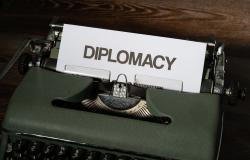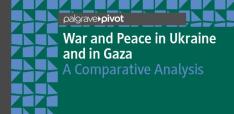‘We don’t do diplomacy anymore’: An interview with U.S. Ambassador Chas W. Freeman Jr.

Recently, The Zambakari Advisory sat down with Ambassador Freeman in a wide-ranging Zoom call, posing questions on a series of subjects relating to the war in Ukraine, U.S. relations with China, the state of U.S. diplomacy, and the role of Africa and its emerging countries in a world shifting from unipolarity to multipolarity.
Considered one of the “whiz kids” of the U.S. State Department when he entered the foreign service in 1965, Chas Freeman Jr. was for nearly 50 years involved in diplomatic service to his country including serving as U.S. Ambassador to Saudi Arabia under President George W. Bush, assistant secretary of defense during the Clinton administration, and interpreter for President Richard Nixon during the path-breaking 1972 China visit.
Below are other excerpts from the March interview with Ambassador Freeman.
On the ability of the U.S. to dictate to Ukraine the outcome of the current conflict:
“Well, there’s a lot of evidence that Mr. Zelensky responds to foreign advice and counsel and direction. The clearest evidence of that was [British Prime Minister] Boris Johnson’s visit to Kyiv [in April 2022], and his apparent sabotage of what appeared to be something very close to an agreement between Russia and Ukraine to end this fight.
“We’ve seen that foreigners can direct Mr. Zelensky away from peace. Whether they could direct him toward peace is another question. Let’s remember, however, that this man, although he is a brilliant actor, is an actor. And there is a considerable reason to doubt that the lines he is delivering are original to him. They certainly serve geopolitical purposes of the sort we were discussing. So, I think the answer is yes, if we wanted to have peace, we could, but frankly, there’s no evidence we want peace.”
On the importance of a European-driven resolution in Ukraine:
“There is a basic principle of conflict resolution, which is that those with the capacity to overthrow the solution have to be part of the solution. You have to have buy-in from those who have a stake in what happens, and you have to convince them.
“My definition of peace is a very bland one. It is a situation that is sufficiently acceptable to those with the capacity to disturb it so that they don’t disturb it. That may make peace sound less noble than it is often portrayed, but I think it’s realistic. So the question of what kind of peace is established eventually, if one is established in Ukraine and therefore between Russia and the rest of Europe, is the core question.”
On the changing U.S.-China relationship:
“I like an analytical framework that distinguishes forms of competition, and I identify three. One form is rivalry. That can be very healthy because it consists of each side — sometimes more than two sides — but each side striving to improve its own performance, and thereby out-compete, outdo the others. That is a competition which is not a zero-sum game. It is positive in its outcomes. And that is what we had for a considerable period of time in the U.S.-China relationship.”
“[There is] ‘adversarial animosity.’ Adversarial animosity is what happens when a runner in a race decides that he or she can win only by tripping up or hamstringing the competitor. Rather than trying to improve his or her own performance, someone who practices this form of competition strives to cripple the opposition. That is where we are with China at the moment.
“[Then, there] is enmity, which implies a desire to annihilate the other side. Perhaps this is the word to describe the total wars that the United States has fought — the Civil War, World War I, World War II, the Cold War — in which the objective was to destroy the enemy and reconstitute the enemy in a form more congenial to the values of the United States.”
“So, with China, we have moved from rivalry — healthy competition — to a very unhealthy competition in which our basic effort to compete is not to improve ourselves very much but to cripple the Chinese.”
On the state of U.S. diplomacy:
“We don’t do diplomacy anymore. If you doubt that, look at the [March 2021] Anchorage [Alaska] meeting between Anthony Blinken, [Chinese officials] Wang Yi and Yang Jiechi, and [U.S. National Security Advisor] Jake Sullivan back at the start of the Biden administration. What was the nature of that meeting? We went in there and we said, ‘We don’t like you. We think you are a moral reprobate; if we can pull you down, we will. We’re certainly going to try to block your progress, but there are a few things we need you to do for us, and could you help us?’ That was the approach. That was remarkably inept, and the result was entirely predictable — an exchange of diatribe rather than anything constructive.”
On the training of tomorrow’s diplomats:
“We’re not. The symbol of this is that the House of Representatives is seriously considering a bill to remove China from the G20. Does the United States control the G20? I don’t think so. So, delusions of grandeur, perhaps, but more importantly, a worldview that is totally out of date.
“The world is now composed not of a dominant, single, unified domain dominated by the United States, as it may have been briefly after the Cold War. The world is composed of multiple competing regional centers — and we’ve done a good deal to bring that about … [International law and regulation] has been replaced in our minds by something called the ‘rules-based order,’ in which we make the rules and decide who they apply to and who is exempt from them. That’s not very persuasive.”
“We need to rediscover the merits of diplomacy, which begins with empathy. Where is the other guy coming from? You can’t persuade anybody effectively, you can intimidate them, but you can’t persuade them, if you don’t address their concerns and their worldview.”
On the role of the “Global South” moving forward:
“I think what the so-called ‘Global South’ — some of which isn’t very far south — wants is their own self-determination, building their own societies to match their own aspirations, not being subjected to outside dictation or interference.
“Let’s take Africa for example … You see Africa at the end of a century with perhaps two billion people, the largest labor force, the youngest labor force on the planet, and currently very robust economic development. These are countries that are succeeding, and that are going to be far more important internationally.
“But, as these countries grow there’s still going to be a need for international global cooperation. And I suspect we will find a way to, for example, give countries like India or perhaps one or more African countries, certainly Japan, perhaps the EU instead of Britain and France, a role in global governance that they don’t have now. That’s a requirement. But that’s for somebody to work out long after I’m dead. So I’ll not croak on about it.”
Dr. Christopher Zambakari, Founder & CEO, The Zambakari Advisory.
Hartley B. and Ruth B. Barker Endowed Rotary Peace Fellow, Assistant Editor, Bulletin of The Sudan Studies Association.
The Zambakari Advisory is a Phoenix-headquartered international consultancy in the areas of strategic intelligence, program design and transitional processes. Twice annually, The Advisory publishes an online Special Issue surrounding issues of global impact as seen through the eyes of recognized leaders in the subject areas. The interview was conducted by Christopher Zambakari, LP.D., founder and CEO of The Zambakari Advisory; Estève Giraud, Ph.D., assistant research professor at Arizona State University’s Swette Center for Sustainable Food Systems; Dr. Benjamin Abelow, author of How the West Brought War to Ukraine; and Stephen Des Georges, content development and communications consultant and TZA editor-at-large.
Photo by Markus Winkler


